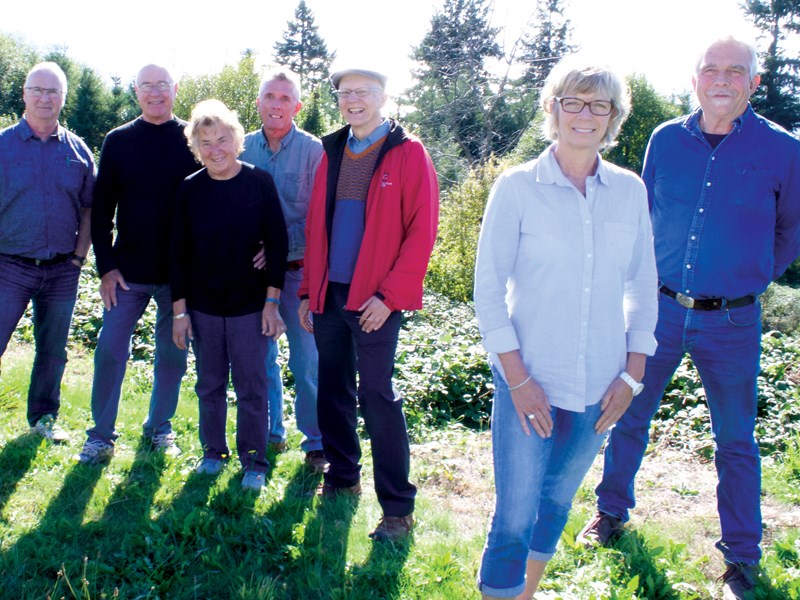Organizers of a meeting on the future of Townsite’s former golf course lands want more say in decisions made by City of Powell River in the future. Since the city acquired the land south of Catalyst Paper Corporation’s mill in 2006, the community has never been asked what its vision for that land is, said meeting co-organizer Diana Collicutt.
“We want to be more engaged in the process,” said Collicutt. “It's been a closed process. It really needs to be more open.”
The public has been told the land, approximately 80 acres, is designated industrial, said Collicutt.
"That was always the plan and the vision for down here; it was for industrial," she added.
City of Powell River chief administrative officer Mac Fraser said at the meeting that PRSC Limited Partnership, a corporation co-owned by the city and Tla’amin Nation, is currently trying to sell the approximate 80 acres at an asking price of $25,000 per acre.
One offer came in for the land, but conditions expired last month and Hummingbird Cove Lifestyles, which owns a land-based aquaculture farm near Saltery Bay, did not renew its offer.
Meeting co-organizer Ron Woznow said the standing-room-only discussion held October 1 at Powell River Public Library was a gauge to determine the community's interest in the future of the land.
"To have 100-plus people show up and be very positive sends the message that the process we would like to see followed is one in which there are regular opportunities for all the residents to help the owners of this land make a really great decision," said Woznow.
While many of the organizers live in Townsite, they said the issue of land’s future is something that should concern everyone. According to the sign-in sheet, Woznow said about half of those attending the Sunday afternoon meeting did not live in Townsite.
Though no one from PRSC attended the meeting, city officials were present, including councillors Karen Skadsheim and Rob Southcott.
"I was hugely impressed that many people came out," said Southcott. "I love it when people engage and want to be involved in what is going on in this community."
Southcott and Fraser were able to answer questions about the process city council took to finalize the location of Powell River’s consolidated wastewater treatment plant.
Southcott said engagement that took place at the meeting is exactly what the city needs to move forward in a more balanced approach toward development. He added that although Powell River’s official community plan designates the land as an employment centre and it is currently zoned as mill-site industrial, that does not mean it has to stay that way.
"We don't have rezone the entire piece," he said.
Organizers jotted down questions asked during the meeting for city officials and landowners to answer at the next meeting, which is planned for mid-October.
Although the group of organizers does not have a formal name, Woznow said they were initially talking about calling themselves Citizens for Open Government. The group includes residents Grant Thomas, Patti Hudson, Doug Hudson, Elizabeth Kolbuch, Dave Wheatley and Collicutt.
Collicutt said the community has been quite reactive to issues as they come up, but civic participation lags outside of that.
"If there's something contentious, people come out," she said, “but participation has to be more ongoing and regular. Council goes along and if people aren't going to meetings then they think everything is fine.”
Collicutt added that the land presents the community with a chance to enhance Powell River’s waterfront.
“There's huge potential for what could happen here,” she said. “There's so much opportunity, but there needs to be a plan.”
Kolbuch, who lives across the road from the old golf course lands, said she wants to see its trails and beaches preserved for the public’s enjoyment.
"It should be open for everyone, just like it was when it was a golf course,” said Kolbuch.
Collicutt said trying to sell the land will result in more industrial usage on Powell River’s waterfront, something towns along the coast are moving away from.
Wheatley, who moved to Powell River about a year ago from the Lower Mainland, said he would not want to see the land turned into an industrial park.
"I don't think that's the right approach,” said Wheatley. “It's too valuable. Industry can go somewhere else. The long-term economic future of the city is better served by having this preserved than by committing more and more industry to it.”
Southcott said he does not think Powell River needs hundreds of acres of space for industrial lands and agrees that moving forward with the community’s interest in the future of the land will ensure what eventually happens will be best for all.
"When we do it slowly, generally what comes about is very good," he said.
Southcott added that it would have sped the process up if more people had participated in the development of the sustainable official community plan (SOCP).
Hudson said he thought the reason why so few people participated in the last public process for the SOCP was the feeling that previous councils did not listen to the community’s thoughts.
"It's great we have a new city council; the old one was so hard to deal with,” said Hudson. “They would call meetings and then never listened. That's probably why there were few people.”



